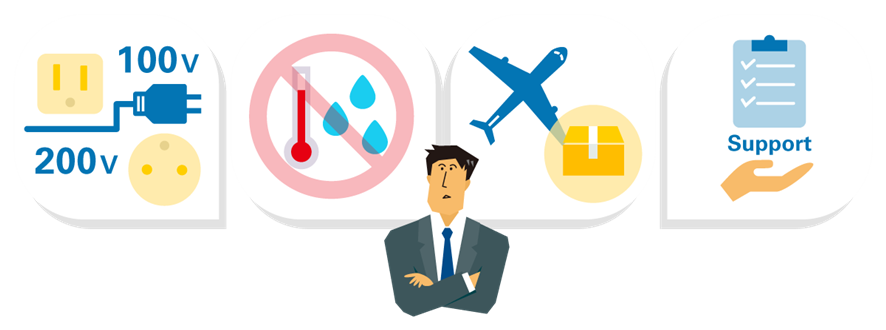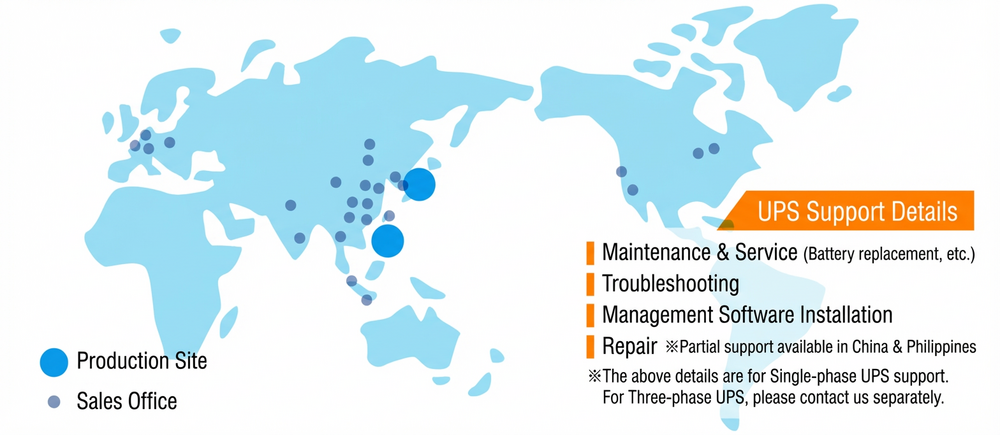



-
- Free Word Search




Demand for UPS (uninterruptible power supplies) is increasing worldwide.
The background to this trend is the development of the IT and communications industries, as well as the development of cloud services and remote environments. In Southeast Asia and India, where many Japanese companies have production bases, there are many areas with unstable power sources, such as frequent blackouts, and UPS has become an important infrastructure supporting production activities.
In this article, we will explain the precautions to take when using a UPS overseas and the international standards that apply overseas.
If I want to use UPS overseas, what should I pay attention to when selecting and transporting?

Voltage and frequency differ between Japan and other countries. Voltage is divided into 100V and 200V systems, with 100V being the mainstream in Japan. Frequency also differs by country, with 50Hz in eastern Japan and 60Hz in western Japan.
When selecting a UPS, you need to check the voltage and frequency of the country in which you will be using it and select a compatible UPS. If you select the wrong one, the load of the UPS may damage your equipment, so you need to be careful.
The shapes of electrical outlets and plugs may differ between Japan and other countries. In such cases, you may need to use an appropriate conversion adapter or take other appropriate measures.
You should also check whether the UPS is suitable for the environment in the country you plan to use it in. UPSs have set "ambient temperature" and "relative humidity" limits for use. If you plan to use a UPS in an area with a different environment than Japan, such as a hot and humid region, you will need to check.
If the batteries used in the UPS are subject to transportation regulations, air and sea transport may be restricted. Since policies may differ depending on the airline, be sure to check in advance.
The lead-acid batteries used in Sanyo SANYO DENKI 's UPS are non-spillable, so they can be treated as non-hazardous goods and transported by air, sea, and land. Lithium-ion batteries have different transport rules, so please contact us separately.
If you use a UPS purchased in Japan overseas, there may be no local service center and you may not be able to receive after-sales service, which can cause problems later on. Therefore, choosing a UPS manufacturer that offers overseas service is also an important factor.
Whether a UPS can be used safely overseas can be determined by whether it is certified to overseas safety standards.
Overseas safety standard certification is a certification that indicates that a product meets certain international safety standards and that the product is confirmed to be safe for use. This means that the product meets specific safety requirements and has been designed, manufactured, and tested in accordance with general safety standards. Overseas safety standard certification is very important for products sold in international markets.
Now, we will introduce the "certification marks" of each country that are used to determine whether a product is certified by overseas safety standards.
*If the UPS is pre-installed in the device or imported together with the device as ancillary equipment, it may be possible to import it locally without the need for a standard. However, when importing a UPS alone, in principle, the UPS is checked for its safety standards in each country. This applies when the UPS is shipped separately due to a breakdown replacement or additional demand.
The "UL Standard" is a product safety standard established by Underwriters Laboratories Inc. (UL).
Its purpose is to standardize the functionality and safety of everything from materials, equipment, parts, and tools to products. Although UL certification is optional, many state projects require UL certification, and many electrical products in the United States are UL certified.
*Quoted from JETRO Trade and Investment Consultation Q&A "Overview of UL Standards: United States"
"CE marking" is a mark that indicates that specified products sold (marketed) in the EU comply with EU standards.
Most of the essential requirements are related to product safety, but in recent years, it has become necessary to declare the conformity of products to the environmental performance standards set out in the RoHS (Restriction of Hazardous Substances) Directive and the Ecodesign Directive through CE marking. The manufacturer (importer) of the product in question, or a third-party certification body acting on its behalf, performs the required conformity assessment and affixes the marking to the product, packaging, and attached documentation. Products with the correct CE marking are guaranteed to be freely sold and distributed within the EU.
*Quoted from JETRO Trade and Investment Consultation Q&A "Overview of CE Marking: EU"
There are certification marks (safety standards) in other countries as well. Here are some of them.
"BIS" is an Indian Bureau of India n Standards (BIS) that requires the acquisition of such standards for products exported and sold to India. In recent years, the number of items to which compulsory certification is applied has been expanding, and UPS cannot be sold in India unless this standard is obtained up to 10 kVA for single phases.
"TIS" is Thai Industrial Standards (Thailand Industrial Standards) is a national standard established to promote standardization in the industrial field. It is called TIS or TIS standard. It applies to all industrial products.
*Quoted from JETRO: Overview of Thai Industrial Standards (TIS) and obtaining the certification mark
"BSMI Certification" is a system whereby BSMI (Bureau of Standards, Inspection and Supervision under the jurisdiction of the Ministry of Economic Affairs of Taiwan) inspects, certifies and approves products manufactured in and imported into Taiwan in accordance with the Commodity Inspection Act. Article 6 of the Commodity Inspection Act stipulates that products that do not meet the inspection standards must not be displayed or sold. The fields of products that are subject to the BSMI Certification are diverse.
*Quoted from: Local Independent Administrative Institution Tokyo Metropolitan Industrial Technology Research Center National Standards Taiwan Edition
At Sanyo SANYO DENKI, we offer UPS that can be used globally.
(For details on each product, please refer to the UPS general catalog here.)
| Safety standard | Input/Output Voltage | Battery | series | Capacity: 1 to 5 kVA | Capacity: 6~20kVA | Capacity 21kVA or more | Backup Time |
|---|---|---|---|---|---|---|---|
| UL | Input/Output 200V (single-phase 2-wire) | Lead-acid battery | E11B | ◎ | 3 minutes | ||
| A11N | ◎ | ◎ | 5 minutes | ||||
| A11M | ◎ | ◎ | 3 minutes | ||||
| lithium ion | E11B-Li | ◎ | 4 minutes | ||||
| A11N-Li※1 | ◎ | ◎ | 10 minutes | ||||
| A11M-Li※2 | ◎ | ◎ | 4 minutes | ||||
| Input/Output 100V (single-phase 2-wire) | Lead-acid battery | E11B | ◎ | 3 minutes | |||
| A11M | ◎ | ◎ | 3 minutes | ||||
| lithium ion | E11B-Li | ◎ | 4 minutes | ||||
| A11K-Li | ◎ | 13min/8min | |||||
| A11M-Li *2 | ◎ | ◎ | 4 minutes | ||||
| CE | Input/Output 200V (single-phase 2-wire) | Lead-acid battery | E11B | ◎ | 3 minutes | ||
| A11N | ◎ | ◎ | 5 minutes | ||||
| A11M | ◎ | ◎ | 3 minutes | ||||
| lithium ion | E11B-Li | ◎ | 4 minutes | ||||
| A11N-Li ※1 | ◎ | ◎ | 10 minutes | ||||
| A11M-Li *2 | ◎ | ◎ | 4 minutes | ||||
| N11B-Li | ◎ | 150 min | |||||
| Input/Output 100V (single-phase 2-wire) | Lead-acid battery | E11B | ◎ | 3 minutes | |||
| A11M | ◎ | ◎ | 3 minutes | ||||
| lithium ion | E11B-Li | ◎ | 4 minutes | ||||
| A11M-Li *2 | ◎ | ◎ | 4 minutes | ||||
| Input/Output 200V (3-phase 3-wire) | Electric double layer capacitor | C23A | ◎ | 1sec | |||
| Input 400V (three-phase, four-wire) / Output 400V (three-phase, four-wire) |
Lead-acid battery | A22A | ◎ | ◎ | ◎ | 10 minutes | |
| Input 400V (three-phase, four-wire) / Output 220V (single phase 2 wire) |
Lead-acid battery | A22A | ◎ | ◎ | ◎ | 10 minutes | |
| TIS (Thailand) | Input/Output 200V (single-phase 2-wire) | Lead-acid battery | E11B | ◎ | 3 minutes | ||
| BIS (India) | Input/Output 200V (single-phase 2-wire) | Lead-acid battery | E11B | ◎ | 3 minutes | ||
| BSMI (Taiwan) | Input/Output 200V (single-phase 2-wire) | Lead-acid battery | A11N | ◎ | ◎ | 5 minutes |
*1: Application in progress, *2: Application in progress
*Regarding capacity: Since the capacity lineup for each series is different, UPS General Catalog Please refer to
It has acquired UL certification (USA), has CE marking (EU), and also has a 200V model in the lineup. Only the 1kVA version of SANUPS E11B (lead-acid battery) has acquired the new Indian Standard (BIS) and Thai Industrial Standard (TIS). It is compatible with a wide operating temperature range, making it the UPS that can be used in the widest range of countries.
Some model numbers are CE marking (EU).
It has a dustproof and waterproof protection rating of IP65, so it can be used outdoors or in dusty environments.
Some model numbers are UL certified (USA) and CE marked (EU). In addition, SANUPS A11N 5kVA and 10kVA models are BSMI certified (Taiwan).
This UPS is a parallel redundant type, so it can prepare for the unlikely event of a UPS failure.
Details page: Parallel redundant type
It bears CE marking (EU).
The lineup is three-phase 400V, ranging from 5kVA to a maximum of 105kVA. This is a modular UPS that allows you to select the capacity in 5kVA increments.
SANYO DENKI also offers UPS that comply with EU directives and safety standards, including the EU Battery Regulation.*1 In addition, because our UPS complies with major EU laws and regulations regarding hazardous chemical substances, you can rest assured that our UPS can be used overseas, and we deliver environmentally friendly products.
*1 The EU Battery Regulation is a regulation issued by the EU in August 2023 that regulates the entire life cycle of products with the aim of reducing the environmental impact of batteries. Our UPS with CE marking (certain model numbers) meets this regulation.
*This content is current as of March 2025.
Sanyo SANYO DENKI has bases in Japan, East Asia, Southeast Asia, North America, and Europe. We also manufacture UPS in Japan and the Philippines, and have Technology Centers that serve as research and development bases.
For details about our global locations, please click here. In most locations, certified technicians are stationed and can provide after-sales services such as battery replacement.

Update date: Release date: